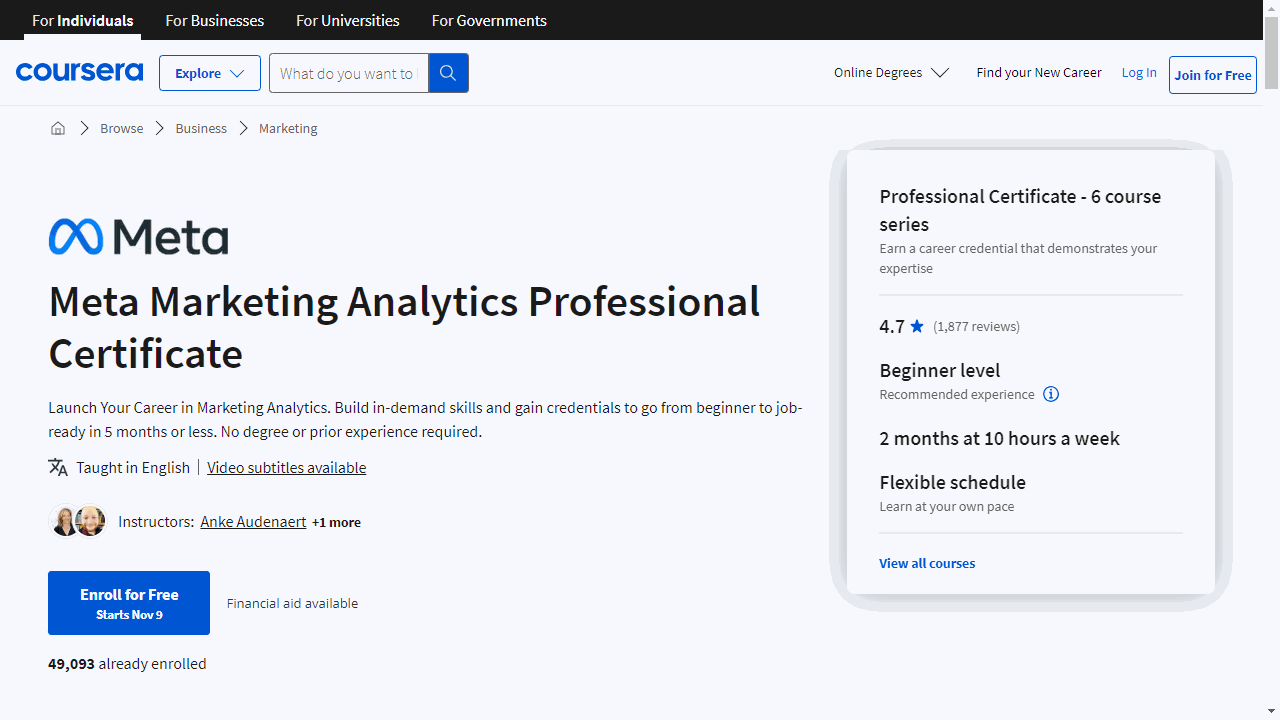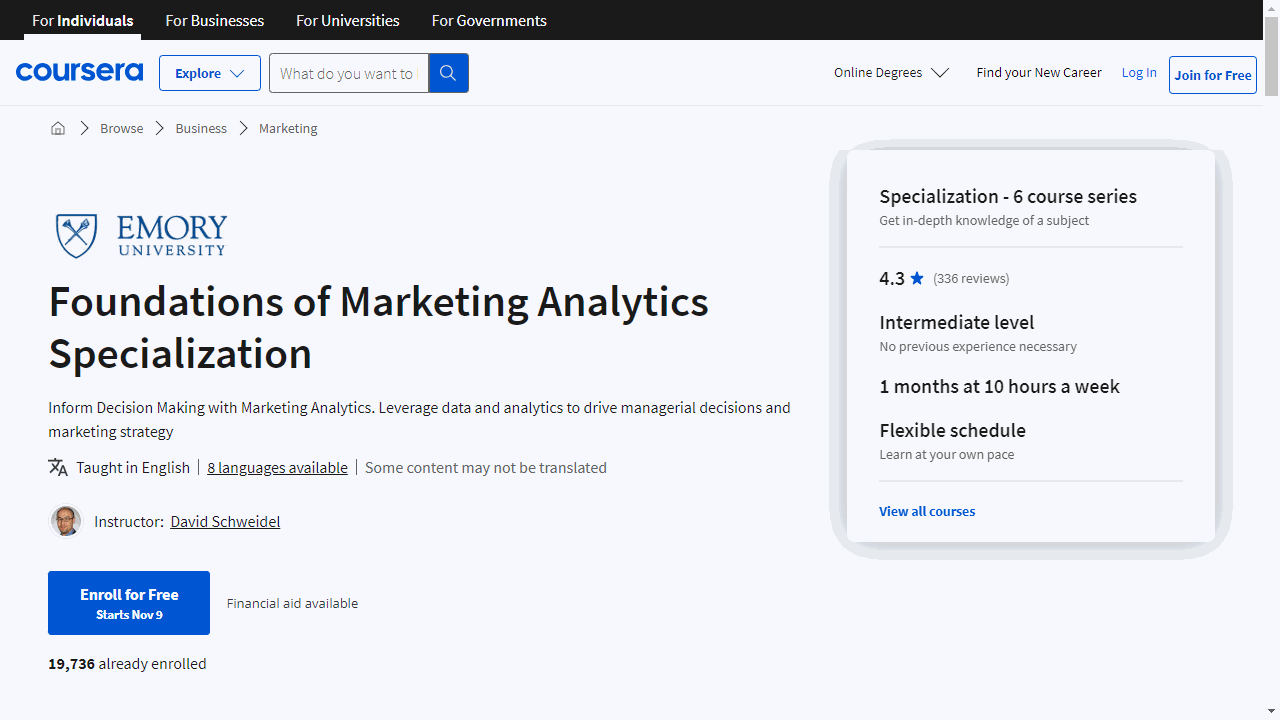Learning marketing analytics can be a game-changer for your career, but finding the right course can be a daunting task.
With so many options available, it’s easy to feel overwhelmed and unsure where to start.
You want a course that’s comprehensive, engaging, and taught by experts, but you also need something that fits your learning style and goals.
We’ve carefully analyzed the top marketing analytics courses on Coursera and have narrowed it down to our top picks.
For the best marketing analytics course overall, we recommend Meta Marketing Analytics Professional Certificate.
This specialization is highly rated for its blend of practical skills and theoretical knowledge, covering topics like data analysis, marketing research, and campaign optimization.
Meta is the second-largest digital advertising platform globally, and this course will give you the tools to leverage its marketing analytics tools effectively.
You’ll learn how to leverage data to make smarter marketing decisions and achieve stellar results in your campaigns.
But if this isn’t the perfect fit for you, don’t worry!
We have a variety of other excellent options to explore.
Keep reading for a deeper dive into our top recommendations, including specialized courses for beginners, intermediate learners, and those looking to master advanced techniques.
Meta Marketing Analytics Professional Certificate
The first course is “Marketing Analytics Foundation,” where you’ll grasp the essentials of marketing principles and the pivotal role of data.
It’s not just about collecting numbers; it’s about understanding what they tell you and how they can guide your marketing decisions.
You’ll get practical experience with tools like the Meta pixel and Google Analytics, all while navigating the complexities of online privacy laws.
As you progress to “Introduction to Data Analytics,” you’ll start to see how setting clear goals and identifying the right metrics can shape your marketing strategy.
The OSEMN framework introduced here will become your systematic guide to making sense of data, helping you to extract valuable insights.
In “Data Analysis with Spreadsheets and SQL,” the focus shifts to the technical skills needed to organize and analyze data.
You’ll learn to clean up data sets, uncover trends, and communicate your findings through compelling visualizations.
The course demystifies SQL queries, empowering you to handle larger datasets with ease.
For those intrigued by programming, “Python Data Analytics” offers an introduction to using Python for data manipulation.
This course is ideal for anyone looking to expand their toolkit beyond spreadsheets, providing a foundation in a language that’s become a staple in the data analysis field.
“Statistics for Marketing” dives deeper into the data, teaching you to understand and apply statistical concepts.
From hypothesis testing to regression analysis, this course gives you the knowledge to interpret data correctly and make predictions that can inform your marketing strategies.
Building on these statistical foundations, “Data Analytics Methods for Marketing” explores specific techniques like segmentation and marketing mix modeling.
This course is about applying your analytical skills to real-world marketing challenges, helping you to forecast and optimize your efforts effectively.
With “Marketing Analytics with Meta,” you’ll gain hands-on experience with Meta’s suite of marketing tools.
Creating ads, running A/B tests, and analyzing campaign performance are just a few of the skills you’ll develop.
This course is tailored for those who want to leverage Meta’s platforms to enhance their advertising strategies.
The program culminates with the “Meta Marketing Science Certification Exam” course, preparing you for a certification that showcases your expertise.
It’s a rigorous test of everything you’ve learned, providing a credential that’s recognized in the industry.
Each course is designed to be accessible, requiring no prior experience in marketing or data analysis—just a willingness to learn.
By the end of the program, you’ll have a robust set of skills that can elevate your marketing career.
Foundations of Marketing Analytics Specialization
In the first course, “Meaningful Marketing Insights,” where you’ll master the use of Microsoft Excel to analyze consumer data.
The course focuses on practical skills, such as exploratory data analysis and regression methods, to help you understand the impact of marketing efforts on sales and consumer choices.
Keep in mind, Excel is essential for this course, but a free trial is available if you need it.
In “Managing Uncertainty in Marketing Analytics,” you’ll learn to navigate the unpredictable nature of marketing.
The course introduces you to spreadsheet-based modeling techniques, including Monte Carlo simulations and probability distributions, to better anticipate a range of outcomes in your marketing decisions.
“Forecasting Models for Marketing Decisions” takes you a step further by teaching you to create forecasting models in Excel.
This course is crucial for those who want to predict customer behavior and plan for future demand, providing you with the tools to evaluate the effectiveness of your models.
For a deep dive into customer insights, “Survey Analysis to Gain Marketing Insights” is invaluable.
You’ll explore how to interpret survey data to inform brand positioning and understand customer segments.
The course covers a variety of statistical methods and situates them within the STP Framework.
It’s important to note that this course requires XL Stat, but a free trial can get you started without additional costs.
“Introduction to Social Media Analytics” is tailored for those eager to harness the power of social media.
You’ll learn to analyze social media data to gain insights into market trends and brand perception.
The course provides foundational knowledge in social media listening and metrics, teaching you to extract meaningful information from the noise.
The specialization culminates with the “Marketing Analytics Capstone Project,” where you apply your new skills to a comprehensive marketing analytics problem.
This project is an opportunity to conduct in-depth data analysis and develop predictive models, showcasing your ability to tackle real-world marketing challenges.
Also check our posts on:


